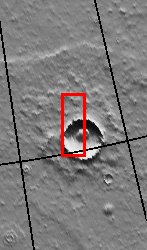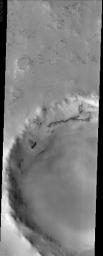Frosted Crater
Caption:

(Released 2 August 2002)
This image, located near 70.6 N and 102.95 E, displays a frosted crater in the Martian northern hemisphere. This image was taken during the northern spring as the CO
2
ice cap starts to sublimate and recede. Exposures of the underlying surface are prominent around topographic features because of the exposure they provide. Features that are more exposed to the relatively warm air will be sublimated away more quickly. South facing slopes in the northern hemisphere are also exposed to more sunlight, which also helps to sublimate the frost. This is why the north rim of the large crater has more exposures of the relatively dark underlying material than the southern (north facing) wall. There are also what appears to be small slides of material on the crater walls. This may be sand that becomes unstable as the frost cover thins.
Cataloging Keywords:
| Name |
Value |
Additional Values |
| Target |
Mars |
|
| System |
|
|
| Target Type |
Planet |
|
| Mission |
2001 Mars Odyssey |
|
| Instrument Host |
Mars Odyssey |
|
| Host Type |
Orbiter |
|
| Instrument |
Thermal Emission Imaging System (THEMIS) |
|
| Detector |
|
|
| Extra Keywords |
Crater, Grayscale |
| Acquisition Date |
|
| Release Date |
2002-08-05 |
| Date in Caption |
2002-08-02 |
|
| Image Credit |
NASA/JPL/Arizona State University |
| Source |
photojournal.jpl.nasa.gov/catalog/PIA03912 |
| Identifier |
PIA03912 |


